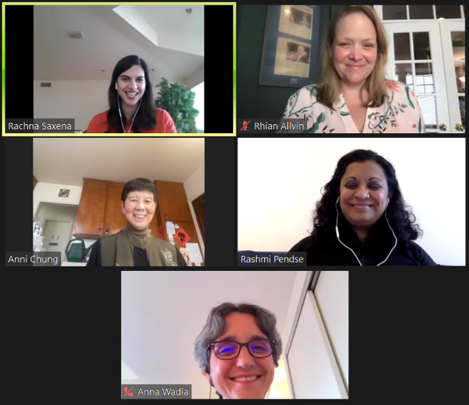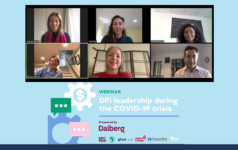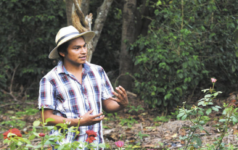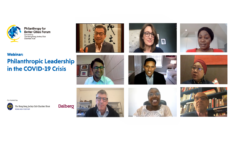Dalberg uses cookies and related technologies to improve the way the site functions. A cookie is a text file that is stored on your device. We use these text files for functionality such as to analyze our traffic or to personalize content. You can easily control how we use cookies on your device by adjusting the settings below, and you may also change those settings at any time by visiting our privacy policy page.
Childcare and home healthcare professionals– who are more than 90% women, and disproportionately women of color and immigrants – have been historically undervalued in the US. Making a median hourly wage of between just $10 to $12 and with limited employee benefits, many are exposed to poverty and need support from public programs. Women of color are even more likely to live in poverty and need public assistance compared to their counterparts. The COVID-19 pandemic means these workers are finally starting to be recognized broadly across the US as essential to reopening and supporting a functioning economy.
As part of the first session in our series on ‘Shaping an Equitable Future in the US’, Dalberg brought together four diverse actors in the care economy to get a first-hand perspective of this crisis and learn the ideas they are exploring to ensure these essential workers are protected and properly valued over the long-term.
Our panelists included: Anna Wadia, Senior Program Officer, Ford Foundation; Anni Chung, CEO, Self Help for the Elderly; Rashmi Pendse, Vice President, Citi Impact Investing, Citi; and Rhian Allvin, CEO, NAEYC, with Rachna Saxena, Associate Partner at Dalberg and co-lead of Dalberg’s Justice, Equity, and Economic Mobility practice as moderator.
Four key insights emerged on how we can deliver a more equitable future for these workers:
1. Recognize that families need care across the lifecycle, and invest in an integrated ‘care infrastructure’ to properly pay workers
“Early childhood educators can’t earn any less, parents can’t pay any more…and so we have got to look to public sector investment”
– Rhian Allvin, CEO, NAEYC
“Our economy cannot function without care work, and in that sense it is a public good and we should invest in it that way… if we don’t, we end up paying for it in so many inefficient ways”
– Anna Wadia, Senior Program Officer, Ford Foundation
Right now, care workers are subsidizing care through low wages. This is particularly true for care workers of color and immigrant care workers that often make lower wages. At the same time, Americans are indirectly funding care services through the government benefit programs many care workers must then rely on. We need to recognize care as a public good that is required across our lifetime, and finance it accordingly.
Caring Across Generations and the National Academy of Social Insurance have developed the concept of ‘Universal Family Care’, a social insurance program that would create a fund in which employees pay in a small amount of their salary – similar to Social Security – from which families could draw to cover costs associated with child care, long-term services and support or paid leave. Eight states and the District of Columbia currently have social insurance programs for paid leave, and Washington State recently became the first to put in place a long-term care program funded through a payroll tax.
2. Develop career pathways and create a stronger and consistent connection between certification and compensation to raise the perceived value of care, and attract and maintain workers
“Caregivers do highly skilled jobs and we can’t undervalue them, else we are going to lose people all the time”
– Anni Chung, CEO, Self Help for the Elderly
“We can’t just have this anything goes, where each State has created their own standards. It actually makes it worse for early childhood educators to enter and progress through the field”
– Rhian Allvin, CEO, NAEYC
Despite increasing demand for care, there is a lack of public awareness of the skills required for these roles, and uncoordinated certification requirements by States. This leads to insufficient training, poorly defined career pathways, and overall undervaluing of care work.
To address this problem for early child educators, NAEYC has led a taskforce of 15 national early childhood education organizations in developing the Unifying Framework for the Early Childhood Education Profession. Released in March, it proposes a nation-wide model that shifts the determinant of compensation away from the location of care towards a standard set of competencies based on three levels that apply across States. By providing greater standardization for these educators, it will help to address the barriers that disproportionately impact women of color from accessing higher paid roles.
3. Invest in new technology and digital innovations that are made for workers, and which help address issues caused by the fragmented nature of the market
“In terms of technology, I think you are right, there are some pitfalls, [but if it] can help people complete compliance standards or address the fragmented nature, …then there are some benefits”
– Rashmi Pendse, Vice President, Citi Impact Investing
“If the technology is simply layered on to a business model that looks at workers as inputs and costs to reduce, then the technology isn’t going to do anything to address the problems of workers’ wages. That is why care workers themselves need to be engaged in designing technology solutions”
– Anna Wadia, Senior Program Officer, Ford Foundation
The disaggregated nature of the care labor market means that there can be significant benefits from models that use technology to address inefficiencies. However, we need to be mindful that these solutions benefit the workers. For example, we shouldn’t support a shift towards a gig economy model without ensuring we address the inherent financial instability and lack of benefits these models typically entail.
NDWA Labs, the innovation arm of the National Domestic Workers Alliance, has developed a digital platform called Alia that makes it easy for domestic workers to receive portable benefits such as paid time off and insurance. At the same time, Citi’s Impact Investing Fund is looking at digital training solutions that provide training content that can be consumed in ways that fit the schedules and budgets of care workers.
4. Continue to bring diverse stakeholders together to ensure impactful change
“On the ground we hear a lot from our workers and the patients we are caring for, whether there is an economic pressure or whether there is a social, language challenge… so we have insights that we can offer”
– Anni Chung, CEO, Self Help for the Elderly
“We look to the non-profits, foundations, and policy researchers to educate ourselves and make sure we are really aware of any inadvertent consequences of investments we make”
– Rashmi Pendse, Vice President, Citi Impact Investing
Each stakeholder has an important role to play in driving towards a more equitable future in coordination with others. Investors need to work closely with Foundations and NGOs so they are aware of potential unintended consequences of new models, thereby supporting responsible investing. At the same time, private investments offer an opportunity to test and develop models that can inform wide scale public solutions, as well as bring new successful models to those on the ground.
In response to the current health and economic crises, several advocacy organizations working on childcare, paid leave and long-term care have begun to strategize together about how to promote significant investments in the care infrastructure as part of an equitable economic recovery agenda. Similarly, funders who have historically supported work in one or the other of these areas are increasingly talking with each other about a broader caregiving frame, and economic security funders are coming to understand the need to improve care jobs and the role caregiving plays in all families’ economic security.
To close, each panelist shared their wish for care workers and the care economy:
- “A coordinated and well-funded system of care across the lifecycle that values everyone who provides care”– Anna Wadia, Senior Program Officer, Ford Foundation
- “More opportunities to recognize our care givers at home …,who are doing the hardest work”– Anni Chung, CEO, Self Help for the Elderly
- “A systemic view of workers, social policies, and safety nets”– Rashmi Pendse, Vice President, Citi Impact Investing, Citi
- “Award subsidies by contract, twelve-month contracts like Headstart is awarded, that are reliable and set a floor, …that alone would be a dramatic transformation of how childcare is funded”– Rhian Allvin, CEO, NAEYC
To discover more, you can listen to a recording of the webinar here, and sign up to receive information on future sessions in the ‘Shaping an Equitable Future in the US’ series here.










